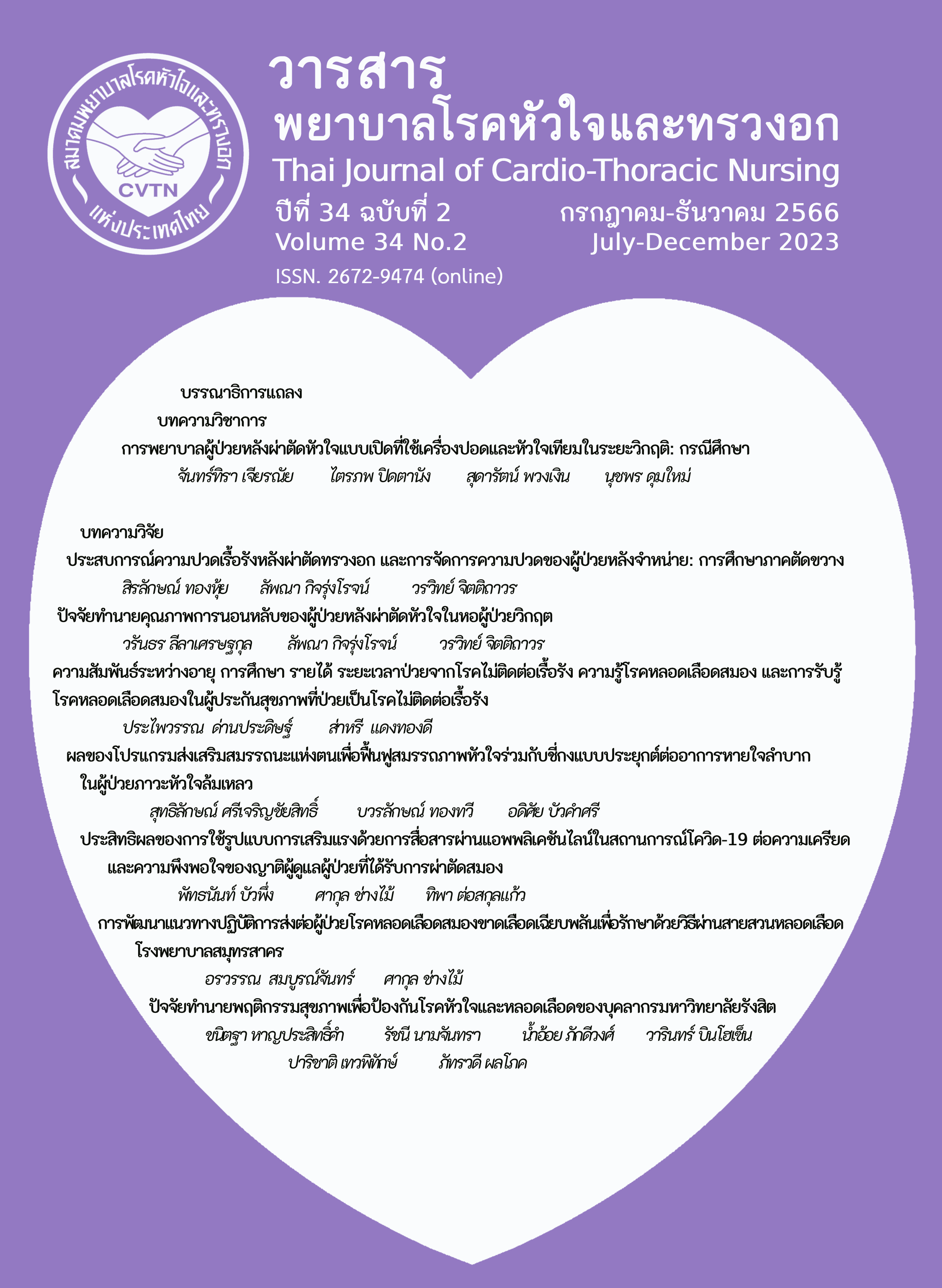The effectiveness of the synergy model utilization with application line during the pandemic covid-19 on the stress and satisfaction of caregivers of patients with brain surgery
Keywords:
The Synergy Model, stress of caregivers , satisfaction of caregivers, Brain Surgery PatientsAbstract
This quasi–experimental research (One-group pretest-posttest design) aimed to examine the effectiveness of the synergy model utilization with Application LINE during the COVID-19 pandemic on the stress and satisfaction of caregivers of patients with brain surgery. The sample comprised 15 caregivers of patients with brain surgery in the Surgery Intensive Care Unit from a tertiary care hospital in Samutsongkhram of was selected by convenience sampling. The research instruments consisted of the AACN synergy model with LINE Application. The other tools used for data collection included personal data of brain surgery patients, personal data of primary caregivers, caregiver’s stress scale, and satisfaction questionnaires. The data were analyzed by using descriptive statistics, frequency, percentage, mean and standard deviation, and inferential statistics using paired t-test and one sample t-test.
The results of the study revealed that after using the synergy model utilization with Application LINE, the mean score for the stress of caregivers of patients with brain surgery was lower than before at a statistical significance (p < .05), and the mean score for the satisfaction of caregivers was higher than 85% of hospital quality certification standard.
Based on the results of this research, can reduce stress and improve satisfaction. Therefore, there should be an encouragement to apply the synergy model utilization with Application LINE for all groups of neurological and brain disease patients during the period of an emerging infectious disease outbreak if it continues in the future.
References
Aiadsuy N. Stress and coping among family caregivers of the patients with brain tumor awaiting for cranial surgery. Ramathibodi Nursing Journal. 2013; 19(3): 349-64. (in Thai).
Suanpam N, Terathongkum S, Sakunhongsophon S. Factors predicting stress on family caregivers of stroke survivors in selected community. Boromarajonani College of Nursing Uttaradit Journal. 2019; 11(2): 133-48. (in Thai).
Chantarasin A. Social support of caregiving patients with stroke: a case study of Nakhonnayok hospital. [Minor Thesis of Bachelor of Social Work Program in Social Work]. Bangkok: Thammasat University; 2017. (in Thai).
Luvira V. Health care for caregivers of patients with terminal illness. Srinagarind Medical Journal. 2013; 28(2): 266-270. (in Thai).
Sutter-Leve R, Passint E, Ness D, Rindflesch A. The caregiver experience after stroke in a COVID-19 environment: a qualitative study in inpatient rehabilitation. J Neurol Phys Ther. 2021; 4: 14-20.
Thongchai C. Apply the synergy model for caring critically ill patients. Thai Journal of Nursing and Midwifery Practice. 2015; 2(1): 5-18. (in Thai).
Weerasathian I. Acute stroke patient’ characteristics and nurse competencies in caring for acute stroke patients based on synergy model. [Master Thesis of Nursing Science]. Nakhon Pathom: Christian University of Thailand; 2012. (in Thai).
Sobaski T, Abraham SP. Nurse competencies and optimization of patient outcomes: The synergy model. Int. j. sci. res. methodol. 2018; 10(1): 164-71.
Khalifehzadeh A, KarimyarJahromi M, Yazdannik A. The impact of synergy model on nurses’ performance and the satisfaction of patients with acute coronary syndrome. Iran. J. Nurs. Midwifery Res. 2012; 17(1): 16-20.
Oliveira SC, Costa DG, Cintra AM, Freitas MP, Jordao CN, Barros JF, et al. Telenursing in COVID-19 times and maternal health: whatsApp@ as a support tool [document on the Internet]. The Institute; 2021 [cited 2021 Mar 8]. Available from: http://www.dx.doi.org/10.37689/actaape/2021AO02893
Petrelli F, Cangelosi G, Scuri S, Pantanetti P, Lavorgna F, Faldetta F, et al. Diabetes and technology: A pilot study on the management of patients with insulin pumps during the COVID-19 pandemic [document on the Internet]. The Institute; 2020 [cited 2020 Sep 28]. Available from: https://doi.org/ 10.1016/j.diabres.2020.108481
Karboon V. The factors of LINE official account that effect to healthcare professional information exposure perception. [Master Independent Study of Management Science]. Bangkok: Mahidol University; 2017. (In Thai).
Chanchaipattana T. Expectation and satisfaction on “LINE Application” [Master Thesis of Faculty of Journalism and Mass Communication Science]. Bangkok: Thammasat University; 2013. (In Thai).
Changmai S. Supportive care needs of family caregiver. Christian University of Thailand Journal. 2016; 22(3): 424-35. (in Thai).
Jirawatkul A. Statistics for health science research. Bangkok: Wittayapat company; 2015.
Noonsab K, Baosoung C, Sansiriphun N. Stress fatigue and postpartum functional status among mothers with cesarean section. Nursing Journal. 2019; 46(1): 31-41. (In Thai).
Samosornsuk W, Kunkum D, Kanjanalak N. A study of expectation and satisfaction of patients Thammasat Heart Center service at Thammasat University Hospital. (Unit Budget Analysis and Planning Unit Research Institute). Bangkok: Thammasat University; 2013. (in Thai).
Andrews E, Berghofer K, Long J, Prescott A, Caboral SM. Satisfaction with the use of telehealth during COVID-19: An integrative review [document on the Internet]. The Institute; 2020 [cited 2020 Aug 12]. Available from: http://www.doi.org/10.1016/j.ijnsa.2020. 100008
Downloads
Published
How to Cite
Issue
Section
License
Copyright (c) 2024 Thai Journal of Cardio-Thoracic Nursing

This work is licensed under a Creative Commons Attribution-NonCommercial-NoDerivatives 4.0 International License.
บทความนี้ยังไม่เคยตีพิมพ์หรืออยู่ในระหว่างส่งไปตีพิมพ์ในวารสารอื่น ๆ มาก่อน และกองบรรณาธิการขอสงวนสิทธิ์ในการตรวจทาน และแก้ไขต้นฉบับตามเกณฑ์ของวารสาร ในกรณีที่เรื่องของท่านได้ได้รับการตีพิมพ์ในวารสารฉบับนี้ถือว่าเป็น ลิขสิทธิ์ของวารสารพยาบาลโรคหัวใจและทรวงอก






